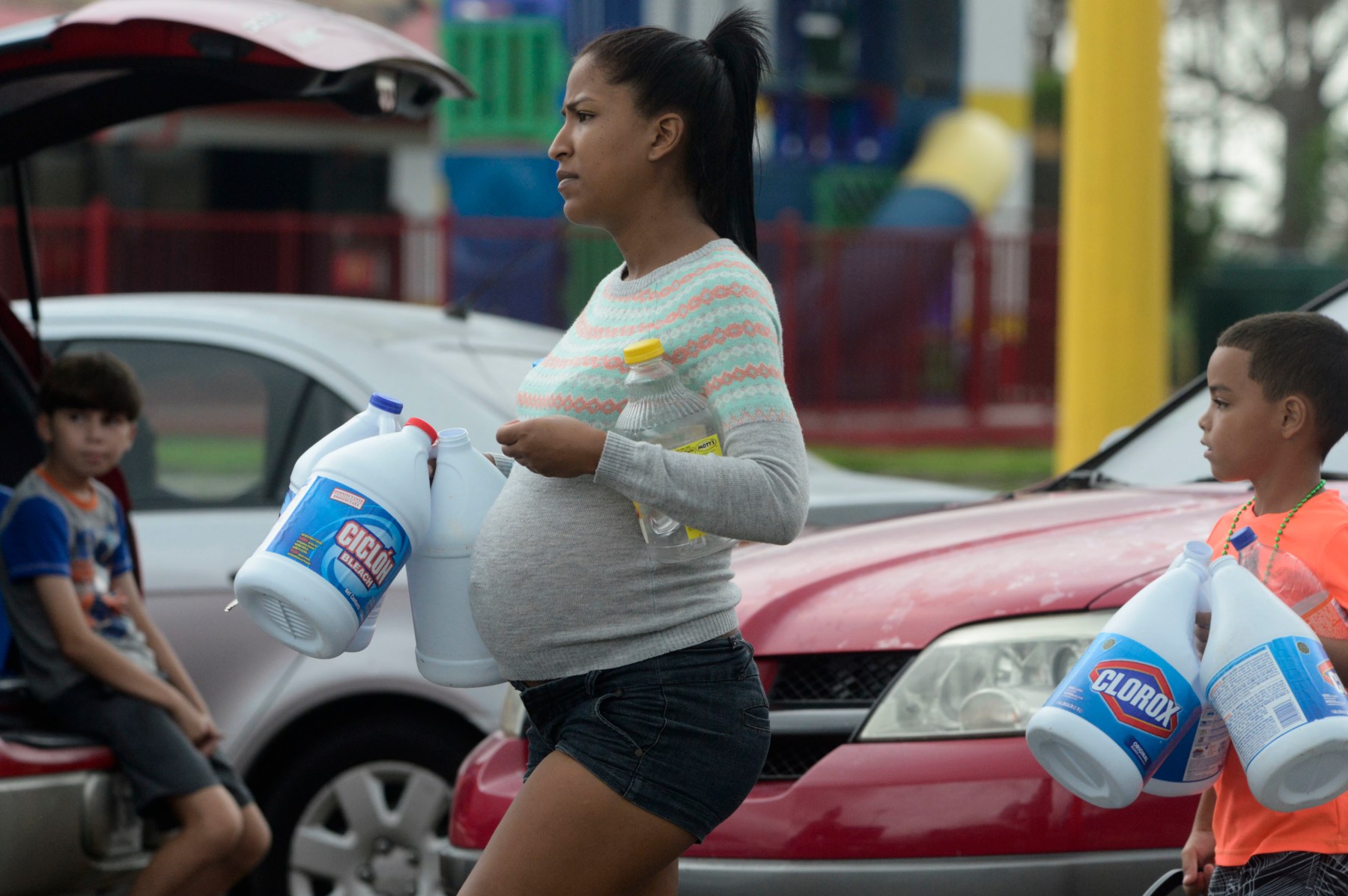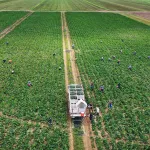Waning abortion access has dominated conversations around reproductive justice, but a lesser known principle of the movement to maintain bodily and reproductive autonomy is being threatened by a changing climate and a slew of environmental contaminants.
One of the main tenets of reproductive justice is the ability to raise a child in a safe and healthy environment, according to SisterSong, one of the leading reproductive justice collectives in the country. But the evidence that pollutants are impacting the health of pregnant people is everywhere.
Lead exposure is resulting in lower fertility rates and a higher risk of stillbirth. Fracking is connected to higher rates of preterm birth and congenital heart defects in newborns. Chemicals like PFAS, commonly found in drinking water, can decrease fertility and have been linked to higher blood pressure in pregnant people. And, because pregnant people drink more water than the average person, they face higher exposures to many of these toxins.
A growing body of research has also linked climate change to adverse health impacts for pregnant people, with both wildfire smoke and extreme heat leading to a rise in poor pregnancy outcomes, including a rise in stillbirths, preterm births and babies with low birth weights.
And like most environmental health disparities, low-income communities of color are the most impacted due both to where they live — in more polluted and hotter parts of cities — and difficulty paying for costly, but sometimes lifesaving, technologies like air conditioning.
Increasingly, environmental justice organizations and reproductive justice advocates are looking for ways to work together to raise the profile of their interconnected fights. Now, they want the government to follow suit.
-
More from The 19th
- Pregnant people are at ‘greater risk’ in states hit hard by wildfire smoke, air pollution, new report shows
- How can we shield children from the impacts of climate change? Investments in schools can help.
- ‘You need water for everything’: Pregnant people and parents struggle to find safe water in Jackson
In November, Human Rights Watch (HRW), an international nongovernmental organization, sent an open letter to the Environmental Protection Agency (EPA) signed by 28 organizations. They asked the agency, which is tasked with protecting human health and the environment, to be more intentional in its work on reproductive justice.
The letter came after the EPA announced in September it was establishing the Office of Environmental Justice and Civil Rights, said Skye Wheeler, emergencies researcher for the Women’s Rights Division of HRW.
“We just felt that this was also an amazing opportunity to weave in reproductive justice, or make sure that the reproductive justice framework is being used as they seek to reach their environmental justice obligations,” Wheeler said.
The letter asked the EPA to create a position at the office dedicated to reproductive justice, and that the agency direct resources to organizations working at the intersection of reproductive and environmental justice, including public health departments. It also asks for resources to go to birth workers like doulas, who play an important educational role in teaching clients how to limit their exposure to toxins and protect themselves from climate challenges like wildfire smoke and extreme heat.
In March, the EPA wrote a response to the letter, reiterating its commitments to environmental justice and pointing out ways in which it is working with other agencies, including the Toxic Substances and Disease Registry, to educate health care providers like obstetricians around exposures to PFAS and lead. It is also trying to better understand how pollutant levels may impact children’s health or the health of a pregnancy through tools like the America’s Children and the Environment initiative, which compiles health indicators of infants and pregnant or breastfeeding people.
Still, Wheeler, and other advocates feel that the agency could benefit by making reproductive justice a more explicit priority.
“They are still missing a piece, which is that in those communities pregnant individuals are facing a whole host of difficulties and their particular rights are not being addressed right now,” she said. “They are not being seen and not being made visible in a way that would make their approach much more holistic and meaningful and much more effective.”
Making a commitment to reproductive justice at the newly formed office, and dedicating a person to helm it, would not only lead to better coordination at the government level, Wheeler argues, but also could better direct funding to work already happening on the ground when for example, lead contaminates a water supply and environmental justice groups rush in to provide safe water to pregnant people or those with small children.
LaTricea Adams the cofounder of Black Millenials 4 Flint, an organization that does work on lead exposure around the country, said working on the environmental aspect of reproductive justice at the grassroots is key to addressing one of the administration’s other priorities — the Black maternal health crisis. Adams, who signed the letter, also sits on the White House Environmental Justice Advocacy Council.
“We appreciate that there has been a larger body of research that is specific to Black women. We need that,” she said. “But we also need investment in the actual services to preserve and protect the lives of Black mothers and Black babies.”
Federal grants usually require a laborious grant application process. Grassroots organizations often don’t have the resources to compete for federal money, but they are usually doing the most immediate work, deploying to evacuation centers during hurricanes to provide supplies to people who are breastfeeding, for example, or educating people about climate risks and environmental exposures during and after their pregnancy.
To get that investment to where it is needed the most requires a “complete overhaul in the way funding models are set up,” Adams said. “With federal funding, we already know trying to get better funding and grants is hell on earth, and not really accessible to your community-based organizations that provide direct services.” Adams continued: “Local birthing centers, or people that work with a collaborative of doulas and midwives, and other ancestral birth workers, they’re severely underfunded.”
The Biden administration has committed to growing the doula workforce in the United States, with the Department of Health and Human Services announcing over $4 million to support community-based doulas last April. But advocates say much more is needed, and opening up more funding from the EPA’s office for environmental justice could help meet vulnerable pregnant people where they are.
Rep. Lauren Underwood, an Illinois Democrat, recently reintroduced the Protecting Moms and Babies Against Climate Change Act, part of a package of bills referred to as the Momnibus, which would do just that. The legislation would create a federal grant program that would invest in community-based efforts to mitigate climate impacts on pregnant people.
“The evidence is clear: extreme heat, air pollution, and other effects of climate change are endangering moms and babies, and we need to take action,” Underwood said in a news release.
In the meantime, organizations like Adams’ are doing intersectional work, like running the Lead Free Mamas program, which trains doulas and other birth workers in effective ways to support and educate birthing people who have either been exposed to lead prior, during or after a pregnancy.
And recently, WE ACT for Environmental Justice, another organization, hired Micaela Martinez as its director of environmental health. Martinez, who has a background in infant and maternal health, is currently working on a campaign that aims to remove toxic chemicals from beauty products that have also been linked with reproductive health issues.
The intersections between environmental and reproductive justice are numerous, she says. But for too long these movements have been seen as separate. “These areas have been very siloed not only scientifically, but then even within the justice space itself,” she said.
Environmental and reproductive justice organizations say they need support more than ever to better address this intersectional issue, but both movements are facing other existential issues as well as limited funding resources.
According to an analysis completed by The New School, a little over 1 percent of the $1.34 billion distributed by national environmental grant makers between 2016 and 2017 was awarded to environmental justice organizations. The disparity was also gendered, with between 70 to 80 percent of funding going to organizations run by men.
“Those of us who are advocates for sexual and reproductive health and rights organizations and reproductive justice organizations are all in one way or another fighting on many fronts in the U.S.,” Wheeler said. “We just had abortion rights, that rug pulled from under us in a very violent way. The maternal health crisis is terrifyingly worsening. But the fact of the matter is, we can’t ignore just the scale of the climate crisis.”
Environmental justice organizations are also fighting for a clean energy transition and against huge industry actors like oil and gas and chemical companies in places like Cancer Alley, a stretch of land on the Mississippi river in Louisiana that has more than 200 petrochemical plants and refineries.
Those organizations on the Gulf Coast “are operating in crisis,” Adams said. “It’s not that they don’t care. It’s literally capacity.”
But building out support at the EPA so that environmental organizations can better take on the necessary work to reach pregnant people could help. For Adams, the role of the EPA in the fight for reproductive justice is simple: “If the womb, the first environment, is not protected, what is life?”







